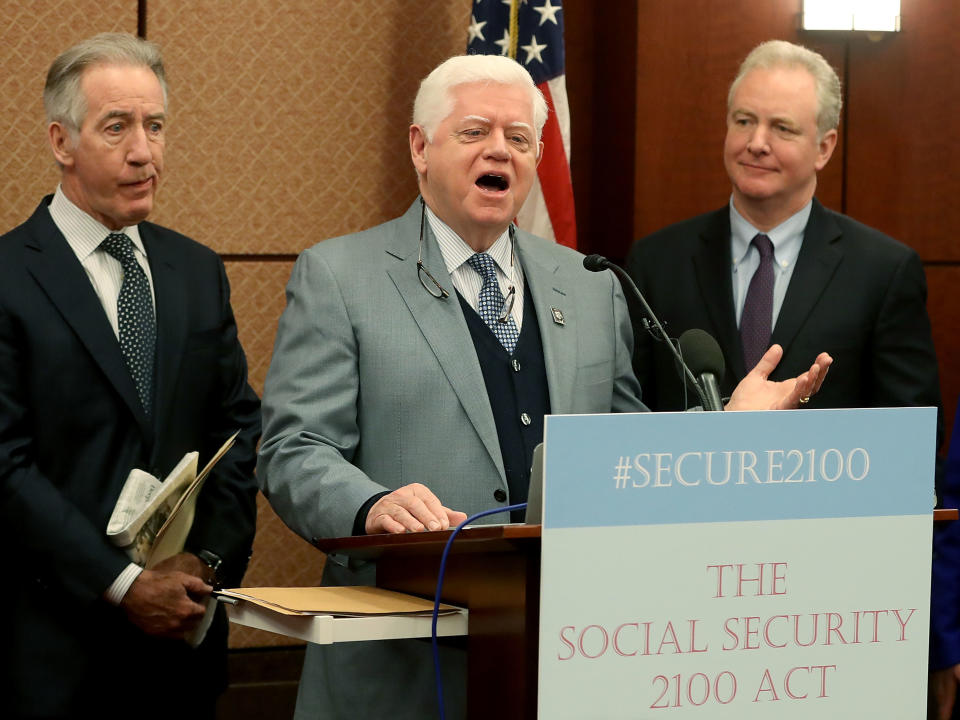On Social Security, 2020 candidate plans miss this one critical issue
With no action, the Social Security trust fund will be depleted in about 15 years, according to the 2019 Trustees report. The leading 2020 candidates have a variety of plans to shore up the program but they fall short of the elusive goal of complete solvency.
“The problem with just scrapping the cap or taxing just the wealthy is that it doesn't make the program sustainably solvent beyond 75 years,” says Rep. John Larson (D, CT), a leader in Congress on the issue, noting that “my take is any solution is important. But here's the bottom line: that's not what Roosevelt intended when the program was initiated.”
A survey of presidential campaigns by Yahoo Finance and the Bipartisan Policy Center’s Funding our Future campaign found a variety of ideas for raising additional revenue with most of the plans focused only on getting revenue through additional taxes on the wealthiest Americans. These plans — thanks to a range of new benefits and no new taxes on the middle class — would extend Social Security’s solvency for only a limited time.
According to the Social Security Administration itself, “solvency for the Social Security program is defined as the ability of the trust funds at any point in time to pay the full scheduled benefits in the law on a timely basis.”
A variety of approaches
Sen. Elizabeth Warren brought up her plan on the debate stage on Tuesday night, though she did skirt the full solvency question a bit. “I've put forward a plan to extend the solvency of Social Security by decades and add $200 to the payment of every person who receives Social Security right now and every person who receives disability insurance right now.”

Warren focused on the additional benefits in her plan instead of the additional taxes needed to pay for it. Warren's full plan would add a "14.8% Social Security contribution requirement on individual with wages above $250,000" as well as taxes on capital gains and other “unearned income" for the wealthiest Americans.
"Regardless of how much money we spend as a nation on top-notch political consultants, the basic campaign strategy really hasn't really changed since sixth grade,” said Jason Grumet, president of the Bipartisan Policy Center, on Yahoo Finance. “The candidate stands up at the front of the room, promises to cancel homework and then throws candy."
Other candidates plans, like Warren, focused on the benefits instead of the costs. Sen. Bernie Sanders says he “will expand benefits across-the-board” and that “the wealthiest Americans in this country must pay their fair share.” Sen. Amy Klobuchar, in her responses to Yahoo Finance, proposed modest benefit increases and to pay for it she supports “subjecting income above $250,000 to the payroll tax and extending the solvency of Social Security.”
One plan for solvency through at least 2092
Larson’s plan, the Social Security 2100 Act, would fund the program until the year 2100 by asking for more from every working American. He would gradually phase in an increase in the contribution rate for all workers, “beginning in 2020, so that by 2043 workers and employers would pay 7.4% instead of 6.2%.” The Social Security payroll tax rate on wages is currently 6.2% for the employer and 6.2% for the employee.

During a recent appearance on Yahoo Finance, Larson noted that Social Security is like an insurance program for old age and “we haven't had an increase since 1983.”
“The last time Congress acted was 36 years ago,” Larson says. “This is an insurance premium. Have any of your insurance premiums gone up since 1983? Of course they have.”
Grumet notes that “what that legislation does is it actually requires the folks in the middle to start to pay additional revenue into the system. It's the most responsible step towards fiscal sustainability."
Jason Fichtner, a former official at the Social Security Administration, adds that Larson "recognizes that you have to spread the tax increases across everyone, including the middle class, and he's being very honest about that."
Larson’s plan will keep the program “solvent beyond 2092,” based on an independent analysis of the act.
Some candidates, most notably former Rep. Beto O’Rourke in his survey response, expressed their support for Larson’s plan.
Fichtner added a warning to the field and to lawmakers who might be inclined to wait, given that the trust fund won’t be depleted for 15 years. "That distance is basically making people think the crisis is not here yet – the crisis is already here,” he says. Getting to solvency now would require a 2.7-percentage-point increase in the payroll tax, he says.
“If we wait until 2035, then it's a 3.7-percentage-point change” he says. “That amounts to a 30% payroll tax increase on Social Security payroll taxes. That's a big tax increase."
Ben Werschkul is a producer for Yahoo Finance in Washington, DC.
Read more:
A plan that could save Social Security and boost the economy — with one big catch
4 ways Washington may soon change how you save for retirement
Read the latest financial and business news from Yahoo Finance
Follow Yahoo Finance on Twitter, Facebook, Instagram, Flipboard, LinkedIn, YouTube, and reddit.
